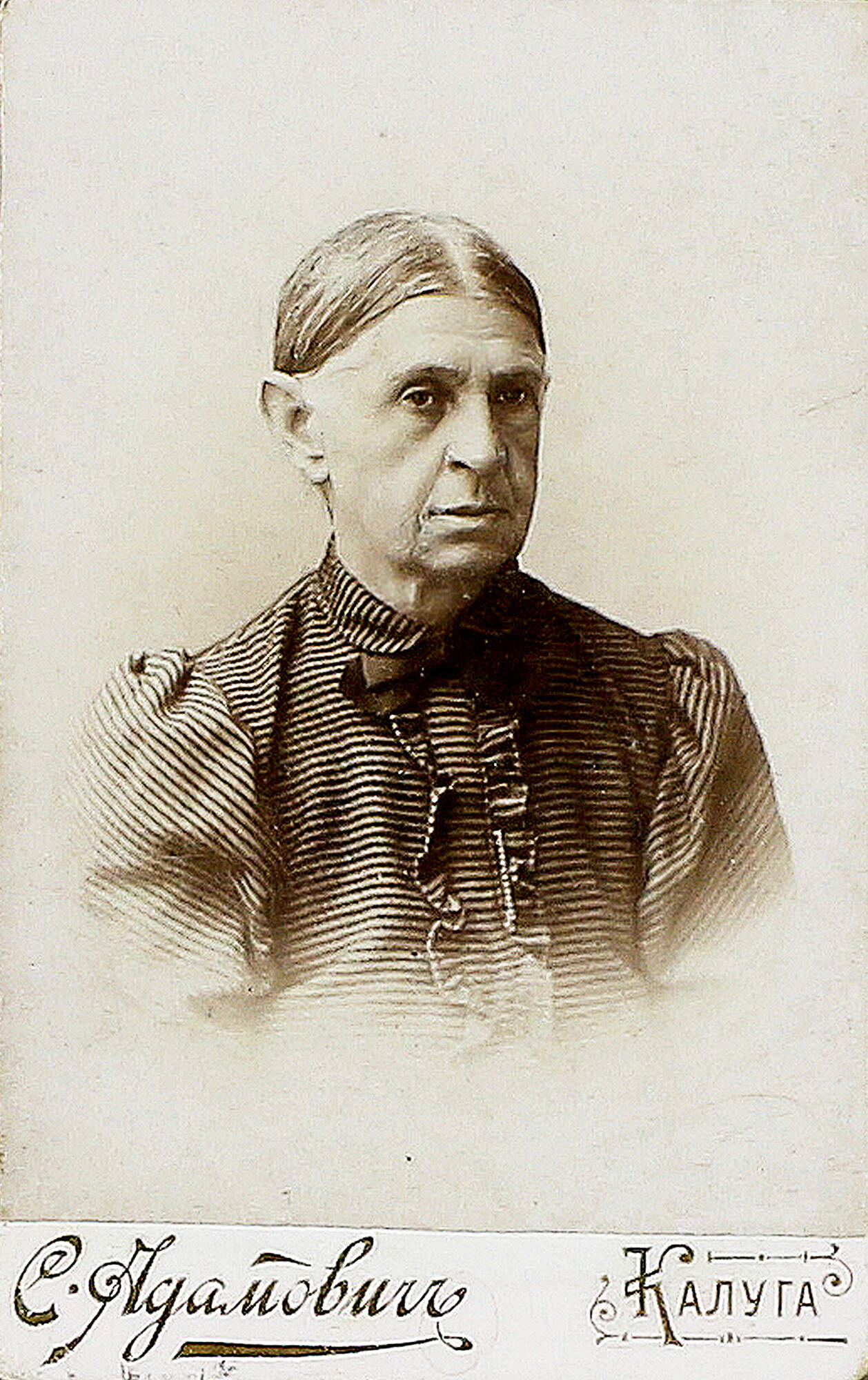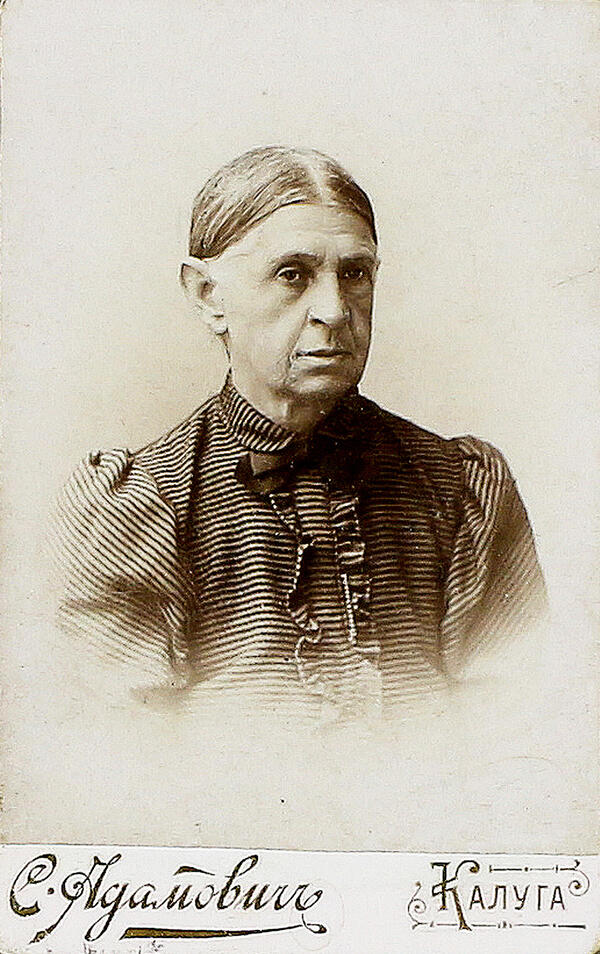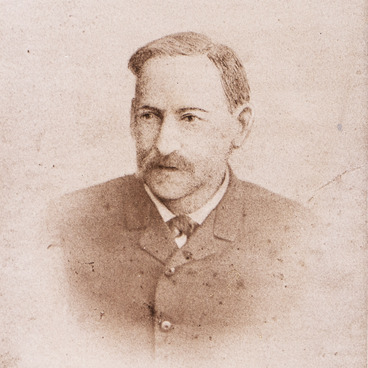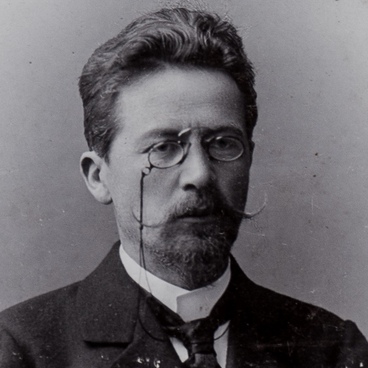Most of Ivan Bunin’s memories of early childhood were connected with Liudmila Aleksandrovna, his mother. He was writing: “I see one thing quite vividly, something beautiful, I am hiding behind the curtain in the living room doors and secretly looking at our mother on the sofa… my mother is very beautiful, in silk, with a collar dress raised and pulled apart to the side with a small neckline on her chest”.
Liudmila Bunina, née Chubarova, was born around 1835 in Ozerki (the territory of the modern Lipetsk region) to the family of Aleksandr Chubarov and his wife Anna. As Vera Muromtseva, Ivan Bunin’s wife, wrote, ‘There was also Bunin’s blood in Liudmila Aleksandrovna – her mother’s grandfather was Ivan Petrovich Bunin’.
Margarita Golitsyna, a distant relative of the Bunins, described Liudmila Aleksandrovna as a woman of ‘small stature, always pale, with blue eyes, always sad, concentrated in herself’. Vera Muromtseva recalled that Bunina ‘was more cultural than her husband, she loved poetry very much, she used to read Pushkin, Zhukovsky and other poets in the old days style’. Close relatives and friends of the family noted that she was very religious and also had a melancholic character: she prayed for a long time in front of large domestic icons, could stand on her knees for hours at night, often felt sad and even cried.
Relationships in the Bunin family were not easy. Aleksei Nikolaevich, the writer’s father, was the exact opposite of his wife: energetic, temperamental, careless and even, in the words of the classic himself, “at times he drank terribly, though he did not have… any typical alcoholic trait”. The spouses had nine children in total, but five of them died in early childhood. Vera Muromtseva recalled: “The Bunin family is very bright, self-righteous, with distinct traits of character, passion and talent. Despite the eternal disputes between some members of this family, which often turned into quarrels, and even faster disappearing, they were all very attached to each other, easily forgiving everyone”s shortcomings, and considered themselves to be some kind of special family, as is often the case in families where the mother is selfless, loves her children to the point of self-forgetfulness and probably imperceptibly convinces them that no one else in the world is better than them”. Liudmila Aleksandrovna really loved Ivan, her youngest son. Muromtseva wrote down how Bunina spoke about him: “Vania was different from other children from birth, that she always knew that he would be “special”, “no one has such a delicate soul like him”, and “no one loves me as much as he does…”.
Ivan Bunin himself said that he inherited his talent from his father, and his character – in many ways from his mother. Thus, in his lyric-autobiographical novel “The Life of Arsenev” he confessed: “For me, my mother was a very special creature among all others, inseparable from my own. I noticed her, I felt her probably at the same time as I felt myself…”. The classic dedicated a series of poems to Liudmila Aleksandrovna, one of which – “Mother” – he had been working on for the whole five years.
Liudmila Bunina, née Chubarova, was born around 1835 in Ozerki (the territory of the modern Lipetsk region) to the family of Aleksandr Chubarov and his wife Anna. As Vera Muromtseva, Ivan Bunin’s wife, wrote, ‘There was also Bunin’s blood in Liudmila Aleksandrovna – her mother’s grandfather was Ivan Petrovich Bunin’.
Margarita Golitsyna, a distant relative of the Bunins, described Liudmila Aleksandrovna as a woman of ‘small stature, always pale, with blue eyes, always sad, concentrated in herself’. Vera Muromtseva recalled that Bunina ‘was more cultural than her husband, she loved poetry very much, she used to read Pushkin, Zhukovsky and other poets in the old days style’. Close relatives and friends of the family noted that she was very religious and also had a melancholic character: she prayed for a long time in front of large domestic icons, could stand on her knees for hours at night, often felt sad and even cried.
Relationships in the Bunin family were not easy. Aleksei Nikolaevich, the writer’s father, was the exact opposite of his wife: energetic, temperamental, careless and even, in the words of the classic himself, “at times he drank terribly, though he did not have… any typical alcoholic trait”. The spouses had nine children in total, but five of them died in early childhood. Vera Muromtseva recalled: “The Bunin family is very bright, self-righteous, with distinct traits of character, passion and talent. Despite the eternal disputes between some members of this family, which often turned into quarrels, and even faster disappearing, they were all very attached to each other, easily forgiving everyone”s shortcomings, and considered themselves to be some kind of special family, as is often the case in families where the mother is selfless, loves her children to the point of self-forgetfulness and probably imperceptibly convinces them that no one else in the world is better than them”. Liudmila Aleksandrovna really loved Ivan, her youngest son. Muromtseva wrote down how Bunina spoke about him: “Vania was different from other children from birth, that she always knew that he would be “special”, “no one has such a delicate soul like him”, and “no one loves me as much as he does…”.
Ivan Bunin himself said that he inherited his talent from his father, and his character – in many ways from his mother. Thus, in his lyric-autobiographical novel “The Life of Arsenev” he confessed: “For me, my mother was a very special creature among all others, inseparable from my own. I noticed her, I felt her probably at the same time as I felt myself…”. The classic dedicated a series of poems to Liudmila Aleksandrovna, one of which – “Mother” – he had been working on for the whole five years.



